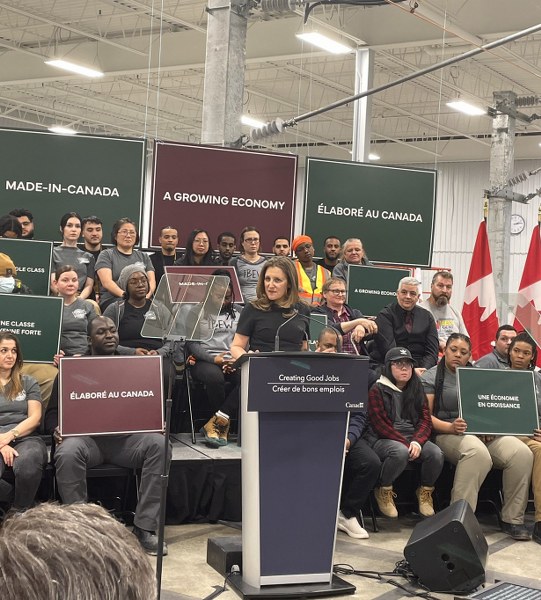 Canada budget
Canada budget Canada’s 2023 budget addresses inflation, govt spending cuts, health, green energy; leaves out housing
Ottawa/IBNS: A federal budget tabled by Canada's Finance Minister Chrystia Freeland on Tuesday addressed inflation, GST rebate for low-income Canadians, and multi-billion-dollar tax credits to stimulate the clean energy sector.
To compensate for the mounting deficits of about $10 billion higher than initially forecast owing to the worsening economy and new spending on initiatives like a national dental care program, Freeland is proposing cuts to government spending and a series of tax increases on the rich and large corporations.
“Our country has a proud tradition of fiscal responsibility. That is a tradition we are determined to uphold,” Freeland has said in a news release and added, “We are reducing government spending by more than $15 billion—while taking great care not to reduce the services and direct support that Canadians rely on.”
Highlights from the federal budget:
A one-time “grocery rebate,” which will provide eligible families with up to $467. Single people with no kids could get up to $234 more.
A 40 per cent increase to Canada Student Grants.
A $13-billion plan to expand dental care to families earning less than $90,000 a year.
A new 15 per cent refundable tax credit for clean electricity investments.
A refundable 30 per cent tax credit for investments in clean tech manufacturing.
Cuts to government spending.
A tax on share buybacks.
Missing from Freeland’s budget is the worsening housing supply crunch due to the country’s addition of more than a million people last year looking for a place to live, while housing starts haven’t kept pace.
The government’s long-promised home savings account offering tax savings for first-time buyers will roll out this year.
The budget also offered no details to protect Canadians with mortgages who are facing exceptional circumstances.
Of the $43 billion in net new spending announced in this year’s budget, roughly 70 per cent is earmarked for health and dental care over the next six years.
“We will ensure that every Canadian can rely on a world-class, publicly funded health care system—one that is deserving of its place at the very heart of what it means to be Canadian,” Freeland has said in a news release.
The budget has fulfilled the government’s commitment to the NDP by setting aside full funding for its dental care plan,
The program with a steep price tag of $13 billion over five years will continue to roll out this year, extending dental services to lower-income Canadians who don’t already have access to a dentist.
Once the program becomes fully operational in 2025, nine million uninsured Canadians with an annual family income of less than $90,000 will qualify for coverage and those with a family income under $70,000 will not have to co-pay.
The program will be run by Health Canada with a “third-party benefits administrator” charged with actually managing program benefits, leaving out the provinces and territories.
Freeland’s budget offers little to help Canadians grappling with depression, anxiety, post-traumatic stress disorder and other ailments.
The largest budget line-item on this file is $158.4 million over three years to launch the 988 suicide prevention phone hotline.
The budget is providing $359.2 million over five years to fight the opioid crisis and to support a “renewed Canadian Drugs and Substance Strategy” including prevention of substance abuse and streamlining the establishment of new “supervised consumption sites.”
A landmark deal has been signed by the government with the premiers earlier this year that will substantially boost the Canada Health Transfer in the coming years.
But the budget doesn’t address how provinces and territories will maintain current healthcare staffing levels and recruit new workers after years of pandemic-related disruptions.
An investment tax credit for clean energy and clean tech has been introduced by the federal government to build a low-carbon future.
The budget offers a 15 per cent refundable tax credit for eligible investments in non-emitting electricity generation systems with the credit to cost an expected $4.5 billion over five years.
To simulate clean technology manufacturing, the budget proposes a refundable tax credit equal to 30 per cent of the cost of investments in new machinery and equipment.
(Reporting by Asha Bajaj)
Support Our Journalism
We cannot do without you.. your contribution supports unbiased journalism
IBNS is not driven by any ism- not wokeism, not racism, not skewed secularism, not hyper right-wing or left liberal ideals, nor by any hardline religious beliefs or hyper nationalism. We want to serve you good old objective news, as they are. We do not judge or preach. We let people decide for themselves. We only try to present factual and well-sourced news.







